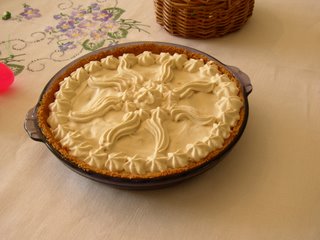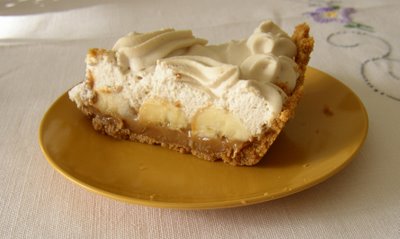
I am continually surprised and delighted by the discovery of interesting regional dishes of which I had been previously unaware. Despite my life-long reading of cookbooks and food magazines, supplemented by regular visits to food and cooking web sites, there are always new little treasures that appear suddenly in my culinary consciousness, offering new opportunities in the kitchen.
Banoffee Tart is a case in point. Despite a vacation trip to London a few years ago, prefaced by my research into her special foods (including such delicacies as mushy peas and jellied eel pie), I only recently discovered Banoffee Tart.
I was doing some research on an ingredient that Latin Americans call “dulce de leche” or “cajeta”. I had known about this stuff for years but had never tried making it. Dulce de leche is a rich thick caramel sauce made by boiling an unopended can of sweetened condensed milk for hours.
Simple enough, but that process is not recommended by the manufacturers of the canned milk due to of the potential danger of explosion. I always scoff at warnings like that, believing they are driven more by fear of liability and its associated costs rather than true safety concerns. However, I do personally know a woman who such an explosion, covering one arm and part of her chest with second and third degree burns. She spent years receiving medical treatments.
One of the major manufacturers of sweetened condensed milk around the world, Carnation, produces cans of already processed Dulce De Leche and makes them available in many countries, such as South Africa, where it is labeled, Treat Caramel. I don’t understand why this product is not available in the U.S. and other countries, but until it is, people will continue to turn sweetened condensed milk into dulce de leche by boiling the cans.
It was while I doing research into all the various ways to make this special caramel sauce (including oven, microwave, and pressure cooker) that I stumbled upon Banoffee Tart. In Great Britain, the caramelized milk is called toffee, and it is the major component in a wildly popular dessert there called Banoffee Tart. The tart is made of bananas layered with the caramel toffee and topped with mounds of whipped cream, often flavored with coffee. Upon reading about this dessert, I could immediately taste that combination of flavors and textures in my mind’s mouth. I quickly decided to make it a reality.
I found several different recipes for Banoffee Tart, with various permutations. As the base recipe for my Banoffee Tart, I settled on the original version from The Hungry Monk, the restaurant that invented this delightful dessert. I made some changes based on appealing variations I found in other recipes and then further adapted it to the unavailability of certain British ingredients here in the U.S.
My Banoffee Tart was as delicious as I expected it to be! I used a graham cracker crust instead of the pastry crust used by The Hungry Monk. Several other recipes I found used a crumb crust made from digestive biscuits, which are not available here, but I sensed that the sweet flavor and crunchy texture of a graham cracker crust would be very complementary to the smooth bananas, sweet thick caramel, and creamy topping.
A few interesting notes about this recipe. The final method I chose for turning the sweetened condensed milk into the caramel uses a pressure cooker. I believer that this is not only safer than the traditional method, but much quicker than any other method (30 minutes versus hours).
I stabilized the whipped cream topping with a tiny bit of unflavored gelatin, a trick I learned from my dessert heroine, Maida Heatter. Not only does it allow the whipped cream’s texture to remain fluffy for a long period of time without separating or running, but when piped through a pastry bag with fancy tips, the patterns hold up well. If you plan to serve this right away, you may skip that step.

Banoffee Tart
Crust:
1 1/4 cups graham cracker crumbs
3 tablespoons granulated sugar
5 tablespoons melted butter
Filling:
1 can sweetened condensed milk, turned into caramel toffee (see note below)
3 – 4 ripe bananas
Topping:
3/4 teaspoon unflavored gelatin
1 1/2 tablespoons cold water
1 1/2 tablespoons confectioners (powdered) sugar
1/2 teaspoon instant espresso coffee powder
1 1/2 cups heavy cream
Preheat oven to 325 degrees F. Chill a medium bowl and the beaters of an electric mixer in the freezer.
Prepare Crust:
In a small bowl stir together the graham cracker crumbs and sugar. Stir in the melted butter with a fork until evenly distributed. Press crumbs firmly and evenly into a pie dish. Chill in the refrigerator for 15 minutes.
Bake until pie shell is firm, golden, and fragrant, about 10 – 15 minutes. Cool.
Prepare whipped cream topping:
Sprinkle the gelatin over the water in a small heatproof custard cup. Let stand for 5 minutes to soften.
Place all but 3 tablespoons of the cream in the chilled bowl. Add the sugar and instant espresso. With chilled beaters, beat until the cream holds a very soft shape. Let stand briefly while you melt the gelatin.
Place the cup of softened gelatin in a little hot water in a small pan over low heat and let stand until the gelatin dissolves.
Remove the dissolved gelatin from the hot water. Quickly stir in the reserved cream and immediately, with the mixer running, add it to the whipped cream. Continue to beat until the cream is stiff, but do not overbeat.
Assemble the pie:
Spread the caramel toffee evenly on the bottom of the pie crust.
Cut the bananas in half and then slice again lengthwise. Arrange bananas, cut side down, in a single layer on top of the toffee, cutting the pieces to fit as necessary. I like to start by laying a banana piece along the outer edge of the pie, with its curved side following the curve of the pie dish. Then I continue that way around the pie in concentric circles, cutting banana pieces to fit as necessary.
Spoon half of the whipped cream topping over the bananas, making sure to cover all the bananas (this prevents them from turning brown). The remaining half of the whipped cream topping may be spooned over in decorative mounds and swirls or piped through a pastry bag with a decorative tip.
Allow to chill for several hours before serving.
Note: To quickly and safely turn a can of sweetened condensed milk into toffee caramel sauce, use a pressure cooker. Remove the labels from a few cans (may as well do a couple at a time), place in a pressure cooker and cover with water by two inches. Seal cover and bring to high pressure. Cook at high pressure for 30 minutes. Remove from heat and allow pressure to decrease naturally. Cool cans to room temperature before opening.
Tags: Banoffee, Dulce de Leche, British Food
No comments:
Post a Comment